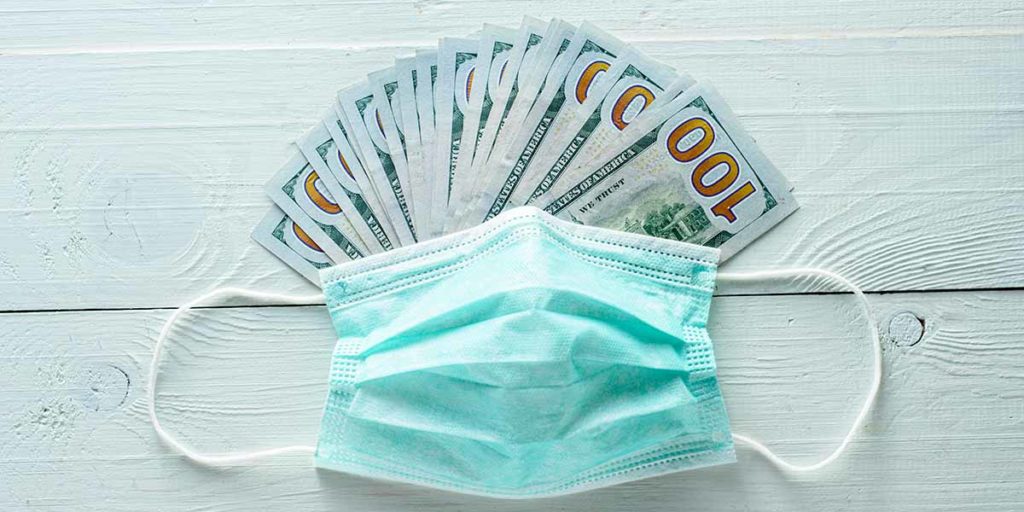It all seems like the plot from a movie. A mysterious virus took us by surprise and swiftly spread across the world, causing a global panic. Schools are closed, factories shut down, and people are fighting over basic supplies such as toilet paper. Initially a health crisis in China, the Coronavirus has quickly evolved into a pandemic. As the virus spreads, financial markets around the world crashed, with many of them falling into bear market territory.
Your investment and retirement savings probably have been hit by the Coronavirus and you want to understand the crash better. In this article, we will dissect the impact of the Coronavirus from an investment point of view and show you how to best protect your hard-earned money.
How did the Coronavirus crash the market?
A virus that slows down economies
To understand the impact of COVID-19 on our economy, we can look at how it has affected China, the first epicenter of the disease. Since January, factories and businesses in China have been shut down to contain the spread of COVID-19. As a result, the economic output in China declined drastically, leading to a shortage of supply of consumer products. According to the National Bureau of Statistics, in January and February, China experienced a 40% decline in construction and a 20% decline in retail sales.
During an extended period of shutdowns, businesses will lose customers and eventually struggle to pay their overheads. As a result, we will see a spike in bankruptcies of small businesses. The crisis also brings bad news to workers. With business struggling to stay afloat, more will be forced to lay off workers or suspend them without pay. With 40% of Americans living from paycheck to paycheck, a rise in unemployment will exacerbate the challenge. The negative impacts can ripple through the economy and lead to a recession. In a nutshell, the Coronavirus devastates the economy by causing a general slowdown in all economic activities.
As the virus spreads internationally, more and more countries have suspended work and school to combat the virus. Expecting an economic slowdown in China, Europe, and the US, investors have been selling their investments to preserve their capital. As a result, the equity market fell like a stone since early March. In merely a week, the Dow fell into bear market territory, giving up years’ of gains.
Panic selling
The second reason the Coronavirus has crashed the stock market is panic selling. The Coronavirus is an invisible enemy. We don’t know how long the crisis can last or if we will get sick tomorrow. Uncertainties are almost always bad for the market and panic means that the market is not reacting rationally. Continuous market selloff spooked investors and led many to sell their investments at losses, leading to even more drops in the market.
What is happening in the market right now?
Equities
As risky assets, stocks, without a doubt, took the biggest hit from the Coronavirus. Falling from its height in February, the S&P stock index has erased 30% of its value because of the Coronavirus crisis. Airlines and the energy sectors had the biggest losses. As countries implement travel bans and travelers cancel their flights, airlines and hotels are taking a major hit. Additionally, the Coronavirus also lowered the demand for oil. The collapse of the alliance between Saudi Arabia and Russia caused oil price and energy stocks to further plummet.
Gold
As a safe haven asset, gold has been used by investors to weather financial crises and uncertainties. However, as we learned in 2008, gold price can fluctuate drastically during a crisis before eventually climbing higher. So far, this has been proven true. After hitting $1,670, gold price has dived along with equities in March. Currently gold is trading at $1,463, almost 200 dollars off its peak before the Coronavirus crisis.
Treasuries
Treasury bonds have had a similar performance as gold. The initial crisis led treasuries to go up. However, since March 9th, treasuries have been dropping. Many factors could drive this selloff. As the demand for dollars grows, central banks and companies might be selling their treasuries in exchange for dollars that they need at this moment.
What the government is doing to fight market volatility
Governments and central banks around the world have been working hard to fight the virus and mitigate its impact. On March 15th, the Federal Reserve announced that it will lower the fed fund rate to zero and restart the Quantitative Easing program used to fight the 2008 subprime crisis. At the same time, the Fed is pouring credit and money into the economy by setting up short-term credit facilities.
The goal of all these policies is to supply more credit and dollars to the financial market. With more credit and money in the market, companies and individuals can still borrow to help them survive the crisis. Without these steps, borrowing will become expensive and scarce, leading more businesses to fail.
Additionally, the government is implementing stimulus packages that will send checks directly to Americans along with tax credits for businesses to help them stay afloat.
All these measures will help counter the negative impact of COVID-19. However, if we don’t contain the actual spread of the virus, these policies might not be enough to help the economy stay healthy during extended shutdowns. That’s why the best way to fight the virus and support our economy is to do small things like washing your hands and social distancing.
How to navigate the Coronavirus market crash
The Coronavirus is scary. It’s a vicious disease that forces us to isolate ourselves. Additionally, its impact on the market has cost investors a lot of money. It’s a special situation that we have never dealt with before and it’s impossible to know where the market will go from here. However, we want to share some investing tips that investors have found helpful during crises. Hopefully, this will help you avoid panic and unnecessary losses.
Tip 1: If you are not calm, you should not react
Like we mentioned before, the market is not rational during crises. Right now, investors are highly sensitive, and they can overreact to any negative movement in stocks and make the selloff even worse. While the market goes down, it’s important to remain calm. Selling in a panic often leads to getting out of your investment at the worst time possible and locking in a huge loss. It’s not uncommon investors sell their positions and only find stocks rebound days later.
Times like this tests an investor’s mental fortitude. Just because the stock is going down, it doesn’t mean your investment has lost its value. Nothing is more important than remaining calm if you want to protect your investments.
Tip 2: look for buying opportunities
Staying calm not only helps you prevent unnecessary losses it also gives you a clear mind to focus on the opportunities in the market. A market crash is not always bad news. In fact, low valuations create buying opportunities as well. When the market is in panic mode, many stocks are undervalued. Smart investors can use this opportunity to buy stocks at a discount.
To help you get your mind off of the terrible crisis, try to focus on finding new opportunities to invest in. Maybe right now is not the time to invest yet, but the time will come. Instead of seeing the market crash as a crisis, you can turn it into an investment opportunity with research and careful decision making.
Crises should remind investors of the importance of research in investing. Well-researched choices outperform casual speculations, especially in tough markets. Use the pain from your losses to learn more about investing so you can make better decisions in the future.
Tip 3: Focus on the long-term
The Coronavirus is scary but the truth is this is probably not the end of the world and the market will rebound eventually like it has done many times before. When we are in a crisis, we get near-sighted and can’t seem to imagine the world when it is all over. But, like many disasters we have overcome, this will pass too.
For example, the 2008 crisis was terrible. Millions lost their homes and Wall Street banks almost crashed the entire global financial system. Yet, when we look back at it now, the crash was only a small bump on your investing journey. It’s important to remember that investing is for the long-term. large daily losses are scary but it’s crucial to focus on your investment in the long-run. In many years, the Coronavirus too will just be a small bump.




